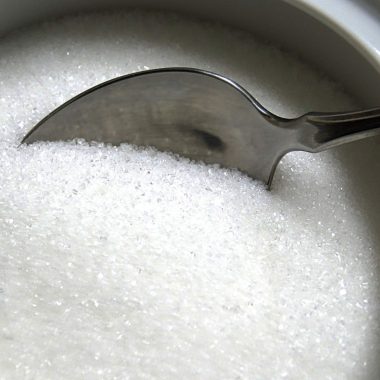It is said that protein can kick you out of ketosis and is hard on the kidneys. But is it really? Let’s find out how much protein you should really be eating on a keto or low-carb diet – it might be way more than you think.
Important disclaimer: this article is for informational purposes only. It’s written based on current scientific research. If you need nutritional advice, please consult your dietitian or doctor.
The importance of protein
Did you know that you are MADE OF PROTEIN? That’s right. Protein and fat are the two essential macro-nutrients (nope, carbohydrate isn’t in the essential list) because our bodies do not function without them. Protein, specifically, is the building block: it’s what our bodies are made off. Our cells, muscles, nails, hair, skin, and even our bones!
Some symptoms that are really common among people on keto and low-carb diets can be associated with a low protein intake: hair loss, brittle nails, skin rashes, and an increased appetite and persistent hunger.
So, why is protein vilified by many keto dieters? Why the widespread belief that protein will kick you out of ketosis? Why the stories of excess protein being bad for your kidneys?
Although plastered all over the internet, the idea that the protein intake must be lower than fat in a ketogenic diet is a myth. It stems from a strict medical version of the diet, created to treat patients with epilepsy. But for the weight-loss dieter, who is not trying to control seizures, limiting protein is not only unnecessary, it makes the keto diet much harder to follow.
Let’s go ahead and demystify protein, this beautiful molecule that is so misunderstood.
Isn’t keto higher fat than protein?
Contrary to common belief, it doesn’t matter how much fat you ingest in the keto diet. The only macro-nutrient that’s key to the keto diet is carbohydrate: keep the ingestion of carbs low enough, and your body will be forced to burn fat for energy instead of glucose. That’s what “being in ketosis” means.
The myth of keto being a high fat diet originated from the most popular and studied medical application of keto, as in a diet to prevent epileptic seizures in children. Which was, not at all, a diet intended for fat loss.
This strictly medical keto diet was high in fat for two reasons: to provide an increased amount of ketones reaching the brain to reduce (and in several cases completely stop) seizures, AND to prevent the children patients from losing too much weight and impeding their physical development.
Therefore, if the intent on a keto diet is to lose body fat, then the consumption of fat needs to be limited, to avoid calorie excess. Dietary intake will take precedence for energy burning, which means that if you eat all the fat needed for your body to burn as energy then it will not dip into its stored fat reserves.
Will too much protein kick me out of ketosis?
No, this is also a myth. For a healthy individual following a keto or low carb diet the ingestion of protein can even help with ketone production, because protein is related to an increase in glucagon levels. Dr. Benjamin Bikman explains in detail in this lecture the relation between glucagon, ketones and protein intake. If carbohydrate intake is limited, you can have a high protein diet and still remain in continual ketosis.
If a person has, in the other hand, insulin resistance, and follows a standard American diet, then protein is in fact bumping up insulin. Protein will spike insulin when it is ingested together with glucose. Insulin when present in high levels will impede the liver from creating ketones.
What about gluconeogenesis?
Gluconeogenesis, another word much maligned in the keto community, is rumored to occur when someone eats too much protein. Gluconeogenesis is a demand driven process in which your body produces glucose – but it will only occur when it’s necessary, not because protein (or anything else) has been ingested. It’s impossible to force the body to over produce glucose above the level it needs.
Also important to note, gluconeogenesis can occur not only using protein as substract, but also glycerol (fat). The very first option for gluconeogenesis, though, is lactate (a by-product of glucose used in muscle cells). So, in the end, GNC will happen if needed, whether you eat protein or not.
We should all be thankful to gluconeogenesis: it is what makes a ketogenic diet possible. It provides glucose to the cells in our bodies that need it, without us having to eat any carbs at all.
I’m not a bodybuilder, should I still have a high protein diet?
Not a bodybuilder? Wrong! As brilliantly explained by Dr. Ted Naiman in this video, everyone is a bodybuilder. You might not have realized it yet, but every choice you make, for everything you put into your mouth to how (and if – couch potatoes beware) you move has a directly relation to the composition of your body.
You can build yourself into a flabby mass of fat and lose skin and weak bones, or you can build your body into an amazing muscular, strong and powerful machine. You are the builder.
Your body is just a reflection of how much thought and care you put into it. And the best thing about this actionable philosophy is: Everyone can do it. Everyone is doing it, without even knowing it. And it does not matter your age, so it’s never too late to start!
Is protein bad for the kidneys?
The dietary restriction of protein is a common treatment recommended for people with renal disease, and there are guidelines limiting protein for kidney patients by the National Kidney Foundation (NFK). These recommendations are not indicated for individuals with normal renal function.
Furthermore, the only kidney patients that respond positively to a protein restriction diet are males suffering of glomerular disease, which constitutes only a small percentage of those with a kidney condition. Still, the mere existence of these guidelines is enough to make the “protein is hard on kidneys” myth take off.
The lay public is often told that high protein diets cause “overwork” (hyperfiltration) in the kidney and may negatively impact renal function over time. That is simply not true. Athletes habitually consume “excess” protein and there is no evidence that they are at greater risk for losses in renal function.
Also, people who live with only one kidney in prolonged hyperfiltration do not show abnormality in the long term. Hyperfiltration appears to be a beneficial biological adaptation.
There are zero evidence based studies that prove that eating a higher protein diet is linked to a decline in renal function in healthy individuals or athletes with high protein diets.
How much protein should we eat?
The population has been led to believe, following the Recommended Dietary Allowance (RDA), that eating just 0.8 grams per kilogram (0.36 grams per pound) of body weight of protein per day is enough. Many preach that eating more than that is unnecessary or just plain harmful. According to Dr. Ted Naiman, that couldn’t be farther from the truth.
The nutritional requirements suggested by governmental entities do not take into consideration that an individual can eat to improve one’s health, by optimizing diet and physical activity. All they care about is that the population will not end in a hospital for malnutrition.
The RDA is actually the minimal amount that a human being needs to survive. As in, not die. Ask yourself, do you want to eat only enough protein not to die from the lack of it? Is that how we should approach nutrition?
The ideal amount of protein for optimal health is indeed much larger than the bare minimum: A new study using a modern test to determine protein requirements proposes that 1.5 to 2.2 grams per kilogram (0.7 to 1 gram per pound) of a variety of high-quality proteins (of animal origin) per day constitutes a reasonable recommendation for the average adult.
So, there you have it. Are you consuming too much protein, or not enough? I hope you have more information now to help you figure it out your ideal macros!





